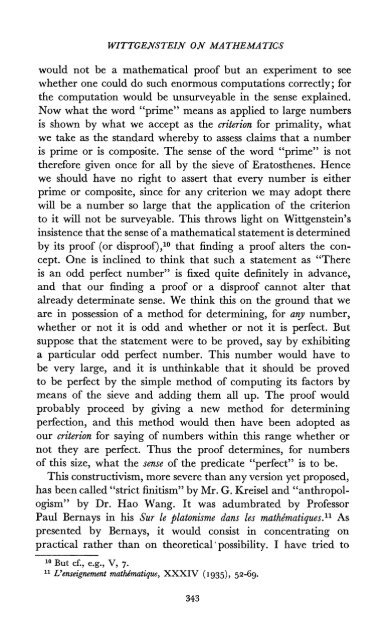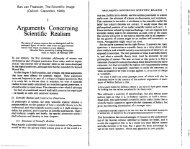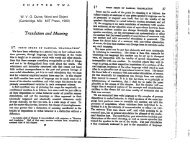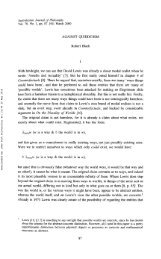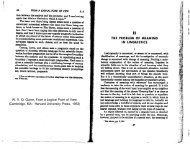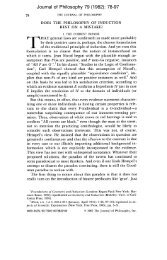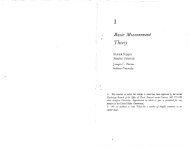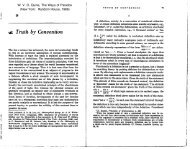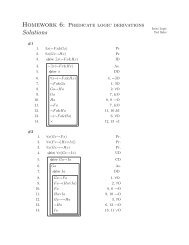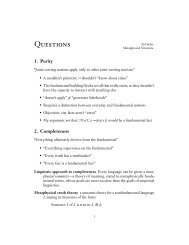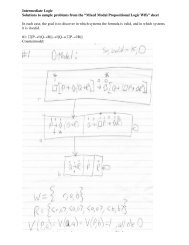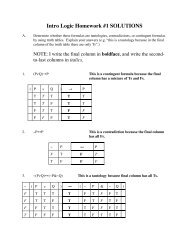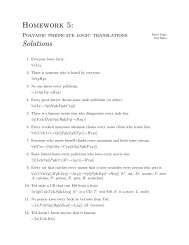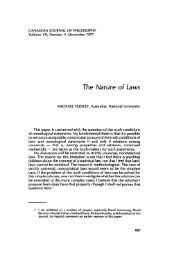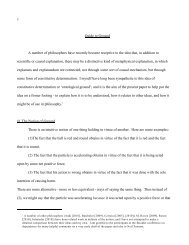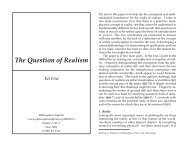Dummett - Wittgenstein's Philosophy of Mathematics.pdf - Ted Sider
Dummett - Wittgenstein's Philosophy of Mathematics.pdf - Ted Sider
Dummett - Wittgenstein's Philosophy of Mathematics.pdf - Ted Sider
Create successful ePaper yourself
Turn your PDF publications into a flip-book with our unique Google optimized e-Paper software.
WITTGENSTEIN ON MATHEMATICS<br />
would not be a mathematical pro<strong>of</strong> but an experiment to see<br />
whether one could do such enormous computations correctly; for<br />
the computation would be unsurveyable in the sense explained.<br />
Now what the word "prime" means as applied to large numbers<br />
is shown by what we accept as the criterion for primality, what<br />
we take as the standard whereby to assess claims that a number<br />
is prime or is composite. The sense <strong>of</strong> the word "prime" is not<br />
therefore given once for all by the sieve <strong>of</strong> Eratosthenes. Hence<br />
we should have no right to assert that every number is either<br />
prime or composite, since for any criterion we may adopt there<br />
will be a number so large that the application <strong>of</strong> the criterion<br />
to it will not be surveyable. This throws light on <strong>Wittgenstein's</strong><br />
insistence that the sense <strong>of</strong> a mathematical statement is determined<br />
by its pro<strong>of</strong> (or dispro<strong>of</strong>),10 that finding a pro<strong>of</strong> alters the concept.<br />
One is inclined to think that such a statement as "There<br />
is an odd perfect number" is fixed quite definitely in advance,<br />
and that our finding a pro<strong>of</strong> or a dispro<strong>of</strong> cannot alter that<br />
already determinate sense. We think this on the ground that we<br />
are in possession <strong>of</strong> a method for determining, for any number,<br />
whether or not it is odd and whether or not it is perfect. But<br />
suppose that the statement were to be proved, say by exhibiting<br />
a particular odd perfect number. This number would have to<br />
be very large, and it is unthinkable that it should be proved<br />
to be perfect by the simple method <strong>of</strong> computing its factors by<br />
means <strong>of</strong> the sieve and adding them all up. The pro<strong>of</strong> would<br />
probably proceed by giving a new method for determining<br />
perfection, and this method would then have been adopted as<br />
our criterion for saying <strong>of</strong> numbers within this range whether or<br />
not they are perfect. Thus the pro<strong>of</strong> determines, for numbers<br />
<strong>of</strong> this size, what the sense <strong>of</strong> the predicate "perfect" is to be.<br />
This constructivism, more severe than any version yet proposed,<br />
has been called "strict finitism" by Mr. G. Kreisel and "anthropologism"<br />
by Dr. Hao Wang. It was adumbrated by Pr<strong>of</strong>essor<br />
Paul Bernays in his Sur le platonisme dans les mathematiques.21 As<br />
presented by Bernays, it would consist in concentrating on<br />
practical rather than on theoretical' possibility. I have tried to<br />
10 But cf., e.g., V, 7.<br />
11 L'enseignement mathematique, XXXIV (I935), 52-69.<br />
343


